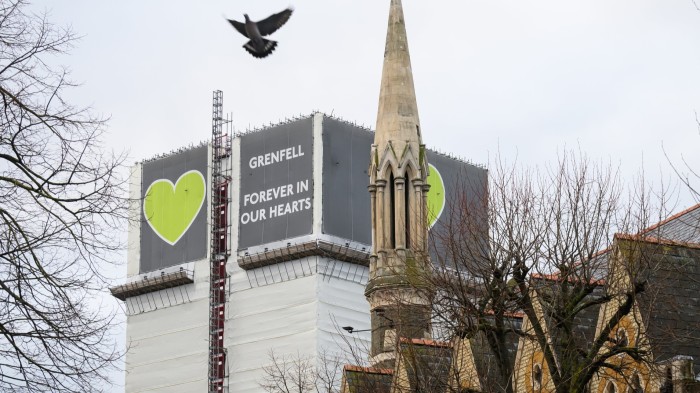Unlock the Editor’s Digest for free
Roula Khalaf, Editor of the FT, selects her favourite stories in this weekly newsletter.
The UK government will move to ban companies named in the public inquiry into the deadly 2017 Grenfell Tower fire from public contracts as it committed to implementing the inquiry’s recommendations.
The six-year inquiry into the tragedy concluded in September with a 1,700 page report detailing “decades of failure” by the government and parts of the construction industry that led to the fire that killed 72 people in the recently refurbished tower block in west London.
The government on Wednesday said it would accept and take forward all 58 of the inquiry’s recommendations and proposed sweeping changes to how construction materials are tested and regulated.
Deputy prime minister Angela Rayner said: “The manufacturing companies including Arconic, Kingspan, and Celotex, whose products were used to refurbish the tower . . . the report found that they acted with systemic dishonesty.”
“Their disgraceful mercenary behaviour put profit before people . . . with fatal consequences”.
The government’s proposed reforms would include “both civil and criminal penalties” for misleading practices or product safety failings by manufacturers of building materials. But officials acknowledge that current rules give them limited powers to go after the companies named in the Grenfell report.
The Metropolitan Police is also investigating the tragedy, but in September said it would take 12-18 months to review the inquiry report. It said its probe covers 19 organisations or companies and 58 individuals as suspects.
The government said on Wednesday it would use powers under recently passed procurement legislation to investigate subsidiaries of Arconic, Kingspan, Saint-Gobain and four other firms for disbarment from government contracts.
A ban would disqualify those companies from any central government contracts, and act as guidance for all public bodies. The government expects that, even where the banned company does not have a direct contract, they should also not be used as subcontractors on public works.
Seven years after the Grenfell fire, successive governments have been criticised as being too slow to respond and lacking tough penalties for the companies involved.
The inquiry report accused US-based Arconic, which supplied the main cladding used on Grenfell Tower, of “a deliberate strategy to continue selling [the cladding material] in the UK based on a statement about its fire performance that it knew to be false”.
The report said that Celotex, at the time majority owned by Saint-Gobain, “embarked on a dishonest scheme to mislead its customers and the wider market” about the safety of its insulation — and that Kingspan also provided misleading information about the fire safety of its insulation products.
Arconic, bought by US private equity group Apollo in 2023, has denied any misleading conduct and rejected claims its subsidiary sold an unsafe product. Celotex said it had “reviewed and improved process controls . . . to meet industry best practice”. Kingspan said its “wholly unacceptable historical failings” were not found to be “causative” of the tragedy.
The government’s paper on reform of product safety rules said the inquiry “pointed to a culture of impunity, where manufacturers can misrepresent product safety with little fear of repercussion”.
The paper outlines plans to tackle remaining “critical gaps” in regulation, including the limited “availability and accessibility” of product information and the scope of current rules, which potentially leave two-thirds of construction material unregulated.
Rayner also acknowledged the housing department “failed to act on known risks” as the government pledged to “carefully review” how it operates.




